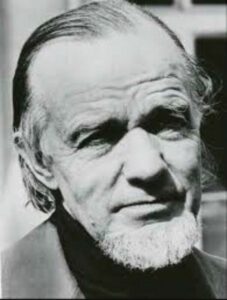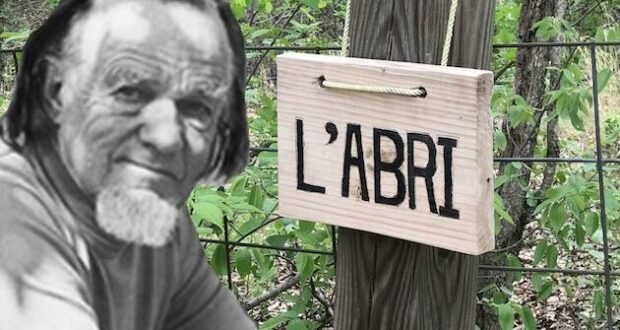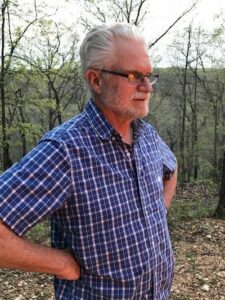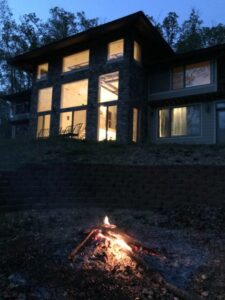Dr. Francis Schaeffer was one of the most influential figures in evangelical Christianity in the 1970s and 1980s. Young people seeking answers traveled to L’Abri, his home in Switzerland, and millions of Christians listened to his lectures, read his books or watched his film series.
 Although Schaeffer died in 1984, his legacy lives on around the world and as near as the rolling hills of southeast Missouri.
Although Schaeffer died in 1984, his legacy lives on around the world and as near as the rolling hills of southeast Missouri.
“L’Abri is very much alive and well,” said Jock McGregor, who leads the Rochester, Minn., branch of L’Abri with his wife, Allison. “We are not looking to be big, but we are looking to have a big impact on the people God brings us.”
McGregor, a native of South Africa, came to faith and met his wife while studying at Swiss L’Abri in the 1980s. He recently discussed Schaeffer’s legacy and the ongoing ministry of L’Abri at the Ebenezer Retreat Center, an extension of Rochester L’Abri near Steelville, Mo. The center is about 90 miles southwest of St. Louis, where Schaeffer once pastored a church.
Missouri connection
“He had a pretty good ministry there with his wife, Edith, and his children,” McGregor told Metro Voice. “He was sent by his denomination to visit Europe at the end of the Second World War to assess the state of the churches. He felt called and moved with his family to Switzerland, which was the one country that was left unscathed after the war. That became his base as he traveled around.”
Schaeffer soon found that the spiritual damage from the increasing secularization of the culture could be as devastating as the physical damage from the war.
“During this time, Schaeffer went through his own mini-crisis of faith,” McGregor said. “He had been in ministry long enough to see that not everything is perfect in the church. Out of it, he came to a point of renewed conviction that the Christian faith really is true to the reality of the universe. God is really there — not just a projection of our minds, not just wishful thinking and not something we inherit religiously from our traditions. The living God is really there, and as a result, we have an anchor for meaning in life.”
Young people asking many of the same questions began to find their way to his home.
“Schaeffer had a wonderful gift to address really deep questions form a breadth of perspectives,” he said. “He sensed God’s calling to a new phase as a family to commit themselves to a ministry of hospitality centered on their home, to open their home to people who were seeking, to offer them hospitality, a cup of tea, a meal and maybe a bed for the night, and in that context to have conversations of relevance. They decided at that point to establish what they called L’Abri, which is a French word that means `the shelter.’”
Schaeffer eventually was persuaded to put his ideas in writing.
“I think that is where many Americans came to know about Francis Schaeffer,” McGregor said. “In the 1970s, he began to write books that were very well received. `The God Who is There’ was his first book. His books were really quite groundbreaking, even in the evangelical world. He addressed himself to questions that a restless generation asked. Those books just took off.”
The legacy continues
He eventually made such acclaimed film series as “How Should We Then Live?” and “Whatever Happened to the Human Race?” At the height of his influence, Schaeffer developed cancer. He and Edith relocated from Switzerland to Minnesota when he began treatment at the Mayo Clinic. Although he died in 1984, the Rochester branch of L’Abri remains.
“Many people wondered what would happen to L’Abri,” McGregor said, “and even we at L’Abri wondered. Following in Schaeffer’ footsteps, we simply waited to see what God would do. Wonderfully, L’Abri has been sustained all of these years. We now have been around longer since he died than before he died, continuing the same principles.”
L’Abri now has 10 branches worldwide, including two in the United States.
“Our number one priority is to be faithful to our legacy,” McGregor said. “We bring the same biblical answers that Schaeffer did, trying to understand the current philosophical, political and scientific critiques of the faith and trying to give credible answers Through word of mouth, people keep telling each other, `Why don’t you visit L’Abri? Maybe you will find answers to your questions.’ That’s what we continue to do today.”
Guests are always welcome to visit Rochester L’Abri, which is about a six-hour drive from Kansas City.
“Anyone is welcome to come up, either for brief a visit to check us out or to book an extended stay,” he said. “We have all age groups and are open to seekers, non-believers or mature Christians. We see all manner of folks coming through, and we love it. It’s a lovely, ever-changing community as people come and go. Even if you come just for the afternoon, you are immersed in the community.”
The Ebenezer Retreat Center is even closer.
“About 20 years ago, we were invited to bring a taste of L’Abri to Missouri outside of St. Louis,” McGregor said. “That has grown, and we come down three times a year. We spend three weeks on a farm in a beautiful retreat center facility and essentially run L’Abri there. We do exactly what we do in Rochester. People come for different lengths of time, and we do exactly the same rhythm of life. It’s not far at all from Kansas City. We usually come down in January, April/May and October.”
Guests also are invited to attend Rochester L’Abri’s annual conference.
“It’s a two-day conference in February in a hotel, so it’s warm and wonderful,” McGregor said. “We normally have 12 to 15 speakers around a theme. It’s a wonderful gathering of 400 or 500 people every year. We have meals together and listen to some superb teaching. It’s a great way to reconnect with L’Abri if you don’t have time to check in at a residential branch.”
Work is still relevant
McGregor encourages Christians who may have been familiar with Francis Schaeffer in the past as well as those who may never heard of him to discover what he has to say amid the culture of the 21st century.
“Dr. Schaeffer was a student not only of culture but of history,” he said. “He believed the further you look back, you could recognize there is a flow to history, a flow to the ideas shaping our culture. They didn’t just come out of nowhere. The more you look back and identify these streams of ideas, you can project them forward.
“Even though he did most of his writing in the 70s, he was writing about trends in the culture that remain with us today. You will find ongoing relevance to his cultural analysis. His teachings on faith and spirituality are eternally relevant, because God’s word is eternal.”
For more information about Rochester L’Abri and the Ebenezer Retreat Center, please visit www.rochesterlabri.org. Learn more about the life and work of Francis Schaeffer at www.francisschaefferstudies.org.
–Alan Goforth | Metrovoicenews.com
Metro Voice is an Amazon Affiliate. If you are interested in any of Schaeffer’s books, check them out below.
 Metro Voice News Celebrating Faith, Family & Community
Metro Voice News Celebrating Faith, Family & Community 










